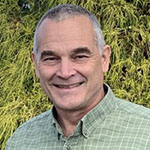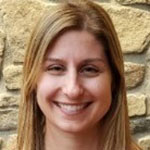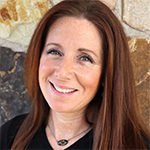by Mike Ford, Maureen Gingerich, and Jessica Fenchel
“We all have dips in our life trajectory, we all have low times emotionally. And in these times, it’s good to get help, it’s important to be there for each other,” visiting speaker Jessica Fenchel shared during the sermon time at Zion (Souderton, PA) during a recent worship service and intergenerational Sunday school on mental health. We read Galatians 6:2 and Matthew 25:35-36 to remind us that we need to be a community of healing for each other, and that mental health is just as important as physical health.
Fenchel, Senior Vice President at Access Services, was joined by Maureen Gingerich, Vice President of Integrated Health Services at St. Luke’s Penn Foundation, to speak with the Zion congregation on this topic, and provide space for questions and answers during Sunday school.
Sharing about the scope of the problem, Fenchel cited, “As many as 70% of high school students in Montgomery County report prolonged experiences of depression and anxiety.”
Emphasizing the negative effects of loneliness and isolation on our health, Gingerich pointed out that the “lack of social connection can be as impactful as smoking 15 cigarettes per day, according to research shared in the Surgeon General’s 2023 Advisory on the Health Effects of Social Connection & Community”.
Yet there is good news: we heal in community. Faith and spirituality are a significant part of healing and growth for most people, and we, as followers of Jesus, can be part of that community of healing. We can create spaces of vulnerability where people can share safely. We can be good listeners. We can cultivate congregational cultures where people feel welcomed, validated, and accepted. We can provide resources for professional help. We can build and maintain caring relationships now so that when times of crisis come, we can step into the gap to support others.
Fenchel reminded us that “We sometimes refer to vulnerability as brave, but it shouldn’t have to feel so brave to be honest about how we’re really doing.” Our congregations can have a role in creating a feeling of safety about sharing honestly.
Gingrich emphasized the importance of community, saying, “Community helps us build and maintain healing connections that sustain us through life’s challenges and joys.”
The COVID-19 pandemic and digital media have affected the way we interact with each other, making it easier not to interact face-to-face. Yet personal, face-to-face interaction is the way God has wired us to best relate to and care for each other. Time together in community, and wise use of technology to enhance our relationships, and professional help for those facing trauma, death, depression, and isolation are all beneficial supports that offer the potential for healing and holistic wellness.
For those seeking to connect with a professional counselor or therapist, talk to a pastor or consider these resources:
- National Alliance on Mental Illness (NAMI)
- Shatterproof resources for drug addiction
- Mennonite Spiritual Directors list
- Access Services (serves Montgomery County, PA)
- St. Luke’s Penn Foundation (a Conference-Related Ministry serving southeastern PA and NJ). Call 215-257-6551.

Mike Ford
Mike Ford loves Jesus and people, and has combined those two loves for the last 40 years through work on a college campus, Program Director at two Christian camps, hospital chaplaincy, and serving as a Youth Pastor and Preaching Pastor at several Mennonite congregations. Mike oversees Zion’s Jr/Sr High youth ministry and helps with its outreach activities.

Maureen Gingerich
Maureen Gingerich, MPH, MSW, LCSW, has 15 years of experience in the behavioral health field, the majority of which have been with St. Luke’s Penn Foundation. She currently serves as Vice President of Integrated Health Services, overseeing the areas of quality, licensing/accreditation, navigation, Administrative Case Management, and HealthConnections.

Jessica Fenchel
Jessica Fenchel is Vice President of Behavioral Health and Chief Operating Officer at Access Services. She has been at Access Services for over 10 years, during which she was key in the startup of innovative initiatives across multiple service spaces including crisis, forensics, schools, and homelessness.
The opinions expressed in articles posted on Mosaic’s website are those of the author and may not reflect the official policy of Mosaic Conference. Mosaic is a large conference, crossing ethnicities, geographies, generations, theologies, and politics. Each person can only speak for themselves; no one can represent “the conference.” May God give us the grace to hear what the Spirit is speaking to us through people with whom we disagree and the humility and courage to love one another even when those disagreements can’t be bridged.
